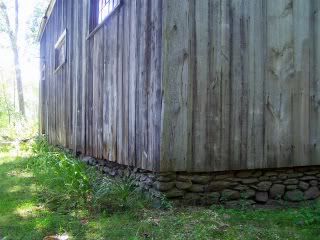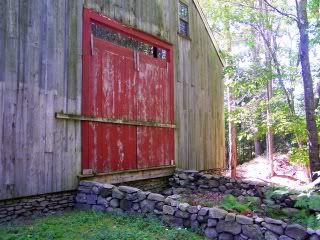|
 Field stone mason
#14289
02/13/08 08:36 PM Field stone mason
#14289
02/13/08 08:36 PM
|
Joined: Jan 2008
Posts: 23
Kevin Holtz
 OP
OP
Member
|
OP

Member
Joined: Jan 2008
Posts: 23 |
Hi All-
I'm in western NY and need a mason that works with field stone foundations. I've made a pile of calls but nobody wants to touch it. Any advice is greatly appreciated!
|
|
|
 Re: Field stone mason
[Re: Kevin Holtz]
#14291
02/13/08 09:53 PM Re: Field stone mason
[Re: Kevin Holtz]
#14291
02/13/08 09:53 PM
|
Joined: Nov 2003
Posts: 1,124
Mark Davidson

Member
|

Member
Joined: Nov 2003
Posts: 1,124 |
DIY... fieldstone is a no brainer.
|
|
|
 Re: Field stone mason
[Re: Mark Davidson]
#14293
02/13/08 11:22 PM Re: Field stone mason
[Re: Mark Davidson]
#14293
02/13/08 11:22 PM
|
Joined: Jan 2008
Posts: 23
Kevin Holtz
 OP
OP
Member
|
OP

Member
Joined: Jan 2008
Posts: 23 |
I thought of taking it on, but I have a lot on my plate already and I'm worried that parts of the foundation won't wait for me to experiment and learn.
I'll poke around a bit online, I'm always up to learn something new.
Thanks again Mark.
|
|
|
 Re: Field stone mason
[Re: Kevin Holtz]
#17632
01/07/09 02:22 PM Re: Field stone mason
[Re: Kevin Holtz]
#17632
01/07/09 02:22 PM
|
Joined: Dec 2008
Posts: 2
Knight Ide

Member
|

Member
Joined: Dec 2008
Posts: 2 |
I'm a mason in Northeastern VT. I have repaired many stone foundations as well as building new ones. I may be able to help you.check out my webpage www.oldeworldmasonry.com You can contact me there or through this forum.
|
|
|
 Re: Field stone mason
[Re: Kevin Holtz]
#17857
01/29/09 02:20 PM Re: Field stone mason
[Re: Kevin Holtz]
#17857
01/29/09 02:20 PM
|
Joined: Feb 2006
Posts: 332
Housewright

Member
|

Member
Joined: Feb 2006
Posts: 332 |
Hi; Dry stone done well is not really a no brainer. Maybe the Dry Stone Concervancy can refer you to someone in your area. http://www.drystone.org/I think a well done dry-laid walls are extremely durable IF the wall is well laid and the ground water around the foundation is properly drained. Jim
The closer you look the more you see.
"Heavy timber framing is not a lost art" Fred Hodgson, 1909
|
|
|
 Re: Field stone mason
[Re: Housewright]
#18152
02/14/09 04:50 AM Re: Field stone mason
[Re: Housewright]
#18152
02/14/09 04:50 AM
|
Joined: Nov 2003
Posts: 1,124
Mark Davidson

Member
|

Member
Joined: Nov 2003
Posts: 1,124 |
Field stone foundations and dry laid stone work are two different styles. Most barn foundations I see around here use mortar between the stones.
Dry stone is not that hard either, provided you have good material(reasonably flat stone), unless you are talking about making fancy arches, etc. In that case I bow down to the experienced mason.
I would encourage anyone to try working with stones, especially field stone or rubble stone barn foundations. The stones you need to do the repair are usually laying right beside the wall, and there are probably plenty more laying around the farm, waiting for you to pick them up for free.
To mix mortar, get some clean sand, a couple bags of portland cement and a bag of lime that is meant to mix mortar with. Play around with your mixture, there should be some suggestions on the lime bag, it's been a while but I seem to remember 10 shovels sand, 3 portland and 1 lime... or was it 21 sand, 3 portland, 1 lime...
Last edited by Mark Davidson; 02/14/09 04:57 AM.
|
|
|
 Re: Field stone mason
[Re: Mark Davidson]
#18153
02/14/09 08:21 AM Re: Field stone mason
[Re: Mark Davidson]
#18153
02/14/09 08:21 AM
|
Joined: Mar 2002
Posts: 961
Ken Hume

Member
|

Member
Joined: Mar 2002
Posts: 961 |
Hi Mark,
I am not that keen on your suggestion to use Portland cement in connection with laying stone walls. Portland cement cures to form an impervious unyielding layer that traps water and can result in freeze / thaw movement damage plus if a timber frame stands on top of this it will cause rapid rot to any contact surfaces. If you need to use mortar then this should be simple lime mortar which will absorb / transmit / re emit water and will yield to slight movement and then re seal itself by water calcium carbonate soluable action. The old ways are the best.
Regards
Ken Hume
Looking back to see the way ahead !
|
|
|
 Re: Field stone mason
[Re: Ken Hume]
#18154
02/14/09 01:43 PM Re: Field stone mason
[Re: Ken Hume]
#18154
02/14/09 01:43 PM
|
Joined: Nov 2003
Posts: 1,124
Mark Davidson

Member
|

Member
Joined: Nov 2003
Posts: 1,124 |
Ken,
Agreed, could you, or anyone, provide a recipe for this simple lime mortar?
I won't agree, however that the old ways are always the best, people are still trying to improve things and sometimes it actually happens.
|
|
|
 Re: Field stone mason
[Re: Mark Davidson]
#18155
02/14/09 02:27 PM Re: Field stone mason
[Re: Mark Davidson]
#18155
02/14/09 02:27 PM
|
Joined: Nov 2003
Posts: 1,124
Mark Davidson

Member
|

Member
Joined: Nov 2003
Posts: 1,124 |
Problem is, I'm trying to think of an example of something that has improved, and not coming up with much. Take diet for example, the average farm animal has benefited from nutritional science, and people know how to eat better, but most of us are in worse shape than we were before the nutrition revolution, so is it better or worse?
Most things I can think of are like this, we know more about keeping houses warm in Canada, but we have more problems with air quality in our tight houses, so it's hard to say if we are ahead...
|
|
|
 Re: Field stone mason
[Re: Mark Davidson]
#18156
02/14/09 03:53 PM Re: Field stone mason
[Re: Mark Davidson]
#18156
02/14/09 03:53 PM
|
Joined: Nov 2006
Posts: 850
mo

Member
|

Member
Joined: Nov 2006
Posts: 850 |
"Agreed, could you, or anyone, provide a recipe for this simple lime mortar?"
I'll go to Vitruvius again,
"mix your mortar, if using pit sand, in the proportions of three parts of sand to one of lime; if using river sand or sea sand mix two parts of sand with one of lime....Further, in using river or sea sand, the addition of a third part composed of burnt brick, pounded up and sifted, will make your mortar of a better composition to use"
supposedly the crushed bricks produced good frost resistance. the hydraulic and semi-hydraulic stuff is a little over my head.
some recorded proportions from up near your parts Mark,
One part lime to 2.2 parts sand : Quebec
One part lime to 2 parts sand: Nova Scotia
|
|
|
 Re: Field stone mason
[Re: Mark Davidson]
#18158
02/14/09 04:08 PM Re: Field stone mason
[Re: Mark Davidson]
#18158
02/14/09 04:08 PM
|
Joined: Mar 2002
Posts: 961
Ken Hume

Member
|

Member
Joined: Mar 2002
Posts: 961 |
Hi Mark,
You are quite correct and I should not have said that the old ways are the best but sometimes old ways do have a better track record than new methods simply because they have stood the test of time. We are now paying a very heavy price here in the UK for the liberal application of Portland cement renders and mortars by the Victorians upon some of our oldest buildings. Attempts at undoing this work can result in serious damage to underlying fabric (brick & timber) and thus oft times it is just left in place knowing quite well that any underlying damage and decay is proceeding apace - undetected.
I am sure that some new things must be better than old. People talk about "keeping up with the times" and hence it might appear that the old ways are somehow valued less than new when with the passage of a little more time this might not actually be the case.
Regards
Ken Hume
Looking back to see the way ahead !
|
|
|
 Re: Field stone mason
[Re: Ken Hume]
#18159
02/14/09 05:22 PM Re: Field stone mason
[Re: Ken Hume]
#18159
02/14/09 05:22 PM
|
Joined: Nov 2003
Posts: 1,124
Mark Davidson

Member
|

Member
Joined: Nov 2003
Posts: 1,124 |
Thx for the recipes, mo.
When doing stone work, even with mortar the stones should always be set with the idea that if the mortar wears away the stones will stay in place. Again, flat stones will help.
Portland in the mix does give strength, and I think that has helped some of the more challenging stone repairs I've done to stay in place. In particular there are doorways in the barns in my area that were not built with care originally, and the sides of these doorways tend to fall in, the rebuild can take some patience to find the right stone or cut the right stone. Add to this that cattle will soon be using the doorway as part of thier fighting arena and one had better wish good luck to the repair.
I wish I could see the buildings you speak of Ken, a visit to the UK remains high on my list of dream vacations...
|
|
|
 Re: Field stone mason
[Re: Ken Hume]
#18160
02/14/09 05:25 PM Re: Field stone mason
[Re: Ken Hume]
#18160
02/14/09 05:25 PM
|
Joined: Mar 2008
Posts: 570
OurBarns1

Member
|

Member
Joined: Mar 2008
Posts: 570 |
Mark, I would like to visit the UK as well...amazing buildings. It would make for a wonderful vacation. Ken, Along that line, I wish I could join you for the recording projects you spoke of in this thread: http://www.tfguild.org/forums/ubbthreads.php?ubb=showflat&Number=18066&Main=18066#Post18066A guy here restores old barns and is a wonderful stonemason. The foundation on this oldie is a hybrid of dry-laid and mortared stone. He mortars the stones but keeps the outside face nearly mortar-free to resemble dry-laid:  This ramp is completely dry-laid:  As far as the "Old Ways," I like them so much I put it on my license plate  :  ...if only I had a TFG bumper sticker to put on this car !
Don Perkins
Member, TFG
to know the trees...
|
|
|
 Re: Field stone mason
[Re: Mark Davidson]
#18161
02/14/09 05:37 PM Re: Field stone mason
[Re: Mark Davidson]
#18161
02/14/09 05:37 PM
|
Joined: Oct 1999
Posts: 463
Roger Nair

Member
|

Member
Joined: Oct 1999
Posts: 463 |
Hi Mark, the ideal mortar mix is dependent on the space between the aggregates, the sand. You can measure that space easily. Take a sample of the sand and bake it to drive off the moisture. Place the sand in a known valume container, a liter for instance. Pour in water, measure the volume of water, until the water level reaches the top of the sand. The water volume represents the ideal volume of lime. Develope a ratio of lime to sand by volume. When mixing mortar, keep the ratio constant by using a bucket for a measure rathe than counting shovel scoops.
Use Type S Hydrated Lime and sharp builders sand. I would avoid silty river sand.
|
|
|
 Re: Field stone mason
[Re: Roger Nair]
#18165
02/15/09 12:03 PM Re: Field stone mason
[Re: Roger Nair]
#18165
02/15/09 12:03 PM
|
Joined: Dec 2007
Posts: 1,882
TIMBEAL

Member
|

Member
Joined: Dec 2007
Posts: 1,882 |
Very nice Roger. So it would appear the sand in Quebec takes on less water while the sand in Nova Scotia needs a tad more water. Why is that? Did some one just not bake the sample as long? Glacial deposited sand, it hasn't been worn down by the ages.
There are many who think the old ways are not as good as modern methods. It must be a mind set. They both have their +'s and -'s, it is our job to select the proper technique for the job at hand. Historic work should reuse the traditional methods and materials. There are always exceptions.
Tim
|
|
|
 Re: Field stone mason
[Re: TIMBEAL]
#18170
02/15/09 02:33 PM Re: Field stone mason
[Re: TIMBEAL]
#18170
02/15/09 02:33 PM
|
Joined: Oct 1999
Posts: 463
Roger Nair

Member
|

Member
Joined: Oct 1999
Posts: 463 |
The difference in mortar mixes can vary due to the size profile of the sand grains. Uniformly large grain sand will have more space between the grains than a mixture of grain sizes. Local differencs in the past, probably occur for a variety of reasons but I don't have any information. Sand is now an idustrial commodity, spec., washed and screened, vary different from what you can dig out of a bank.
Last edited by Roger Nair; 02/15/09 02:34 PM.
|
|
|
 Re: Field stone mason
[Re: Roger Nair]
#18190
02/16/09 12:17 PM Re: Field stone mason
[Re: Roger Nair]
#18190
02/16/09 12:17 PM
|
Joined: Dec 2007
Posts: 1,882
TIMBEAL

Member
|

Member
Joined: Dec 2007
Posts: 1,882 |
Was the sand used in the past washed and screened? Or is this a modern practice enacted to perfect the process?
Tim
|
|
|
 Re: Field stone mason
[Re: TIMBEAL]
#18202
02/16/09 10:03 PM Re: Field stone mason
[Re: TIMBEAL]
#18202
02/16/09 10:03 PM
|
Joined: Mar 2008
Posts: 570
OurBarns1

Member
|

Member
Joined: Mar 2008
Posts: 570 |
Tim,
"Washed and Screened" is a modern product from our point of view. It creates unifomity and removes foreign objects. For the most part, it's a modern gravel pit product...like Roger said, a by-the-yard "commodity."
Don Perkins
Member, TFG
to know the trees...
|
|
|
 Re: Field stone mason
[Re: Will Truax]
#18305
02/20/09 04:12 PM Re: Field stone mason
[Re: Will Truax]
#18305
02/20/09 04:12 PM
|
Joined: Nov 2006
Posts: 850
mo

Member
|

Member
Joined: Nov 2006
Posts: 850 |
to Will's point, if I remember correctly....
At least in brick work the lime based mortar is the sacrificial element in the brick mortar partnership. It is easier to restore mortar than brick. When you fix old brick work with Portland this relationship turns vice versa.
|
|
|
 Re: Field stone mason
[Re: mo]
#18314
02/20/09 11:05 PM Re: Field stone mason
[Re: mo]
#18314
02/20/09 11:05 PM
|
Joined: Dec 2007
Posts: 1,882
TIMBEAL

Member
|

Member
Joined: Dec 2007
Posts: 1,882 |
Good old utube, I will have to spend an evening or two there.
Notice the fellow in the short pants, I wonder If he has any burn marks.
Tim
|
|
|
 Re: Field stone mason
[Re: TIMBEAL]
#20890
08/10/09 01:19 AM Re: Field stone mason
[Re: TIMBEAL]
#20890
08/10/09 01:19 AM
|
Joined: Feb 2006
Posts: 332
Housewright

Member
|

Member
Joined: Feb 2006
Posts: 332 |
Hi Guys;
Just one overdue comment. There have been buildings built in Maine using sea water in the lime mortar and they did not hold up. Don't use salt water.
I can't say I have ever seen a mortar laid wall in Northern New England, just dry laid, sometimes pointed with mortar from the inside in a cellar.
Jim
The closer you look the more you see.
"Heavy timber framing is not a lost art" Fred Hodgson, 1909
|
|
|
 Re: Field stone mason
[Re: Housewright]
#20891
08/10/09 11:14 AM Re: Field stone mason
[Re: Housewright]
#20891
08/10/09 11:14 AM
|
Joined: Dec 2007
Posts: 1,882
TIMBEAL

Member
|

Member
Joined: Dec 2007
Posts: 1,882 |
Jim, nice to see your comments and question. Also interesting timing, I have just started a stone wall under the building attaching the house and barn. I have been wondering if I should use mortar or not. I started with a little dry premixed lime from Virginia Lime Works, I had some left over from a different job, laying the stone with mortar. Laying the stone with no mortar is much more relaxing, I can now feel better about it and point later. I will use a bed of mortar to set the sills on. The mortar will be to keep the cold winter drafts at bay.
Tim
|
|
|
|
|